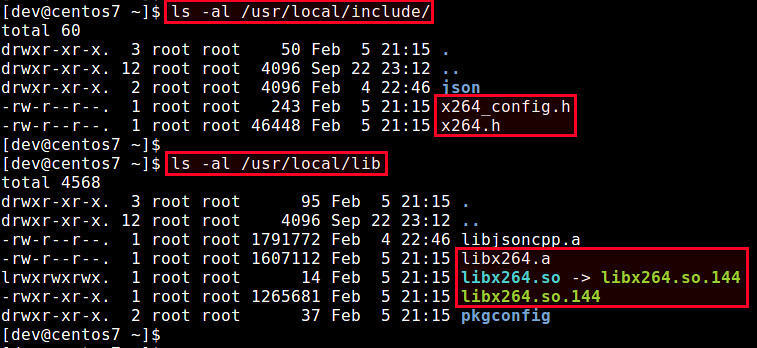mirror of
https://github.com/LCTT/TranslateProject.git
synced 2025-01-04 22:00:34 +08:00
91 lines
4.0 KiB
Markdown
91 lines
4.0 KiB
Markdown
Linux FAQs with Answers--How to fix “fatal error: x264.h: No such file or directory” on Linux
|
|
================================================================================
|
|
> **Question**: I am trying to build a video encoding application from the source on Linux. However, during compilation, I am encountering the error: "fatal error: x264.h: No such file or directory" How can I fix this error?
|
|
|
|
The following compilation error indicates that you do not have x264 library's development files installed on your Linux system.
|
|
|
|
fatal error: x264.h: No such file or directory
|
|
|
|
[x264][1] is an H.264/MPEG-4 AVC encoder library licensed with GNU GPL. The x264 library is popularly used by many video encoder/transcoder programs such as Avidemux, [FFmpeg][2], [HandBrake][3], OpenShot, MEncode and more.
|
|
|
|
To solve the above compilation error, you need to install development files for x264 library. Here is how you can do it.
|
|
|
|
### Install x264 Library and its Development Files on Debian, Ubuntu or Linux Mint ###
|
|
|
|
On Debian based systems, x264 library is already included in the base repositories. Thus its installation is straightforward with apt-get as follows.
|
|
|
|
$ sudo apt-get install libx264-dev
|
|
|
|
### Install x264 Library and its Development Files on Fedora, CentOS/RHEL ###
|
|
|
|
On Red Hat based distributions such as Fedora or CentOS, the x264 library is available via the free repository of RPM Fusion. Thus, you need to install [RPM Fusion (free)][4] first.
|
|
|
|
Once RPM Fusion is set up, you can install x264 development files as follows.
|
|
|
|
$ sudo yum --enablerepo=rpmfusion-free install x264-devel
|
|
|
|
Note that RPM Fusion repository is not available for CentOS 7 yet, so the above method does not work for CentOS 7. In case of CentOS 7, you can build and install x264 library from the source, which is explained below.
|
|
|
|
### Compile x264 Library from the Source on Debian, Ubuntu or Linux Mint ###
|
|
|
|
If the libx264 package that comes with your distribution is not up-to-date, you can compile the latest x264 library from the source as follows.
|
|
|
|
$ sudo apt-get install g++ automake autoconf libtool yasm nasm git
|
|
$ git clone git://git.videolan.org/x264.git
|
|
$ cd x264
|
|
$ ./configure --enable-static --enable-shared
|
|
$ make
|
|
$ sudo make install
|
|
|
|
The x264 library will be installed in /usr/local/lib. To allow the library to be used by other applications, you need to complete the last step:
|
|
|
|
Open /etc/ld.so.conf with a text editor, and append the following line.
|
|
|
|
$ sudo vi /etc/ld.so.conf
|
|
|
|
----------
|
|
|
|
/usr/local/lib
|
|
|
|
Finally reload all shared libraries by running:
|
|
|
|
$ sudo ldconfig
|
|
|
|
### Compile x264 Library from the Source on Fedora, CentOS/RHEL ###
|
|
|
|
If the x264 library is not available on your Linux distribution (e.g., CentOS 7) or the x264 library is not up-to-date, you can build the latest x264 library from the source as follows.
|
|
|
|
$ sudo yum install gcc gcc-c++ automake autoconf libtool yasm nasm git
|
|
$ git clone git://git.videolan.org/x264.git
|
|
$ cd x264
|
|
$ ./configure --enable-static --enable-shared
|
|
$ make
|
|
$ sudo make install
|
|
|
|
Finally, to allow other applications to use x264 library installed in /usr/local/lib, add the following line in /etc/ld.so.conf:
|
|
|
|
$ sudo vi /etc/ld.so.conf
|
|
|
|
----------
|
|
|
|
/usr/local/lib
|
|
|
|
and reload all shared libraries by running:
|
|
|
|
$ sudo ldconfig
|
|
|
|

|
|
|
|
--------------------------------------------------------------------------------
|
|
|
|
via: http://ask.xmodulo.com/fatal-error-x264-h-no-such-file-or-directory.html
|
|
|
|
译者:[译者ID](https://github.com/译者ID)
|
|
校对:[校对者ID](https://github.com/校对者ID)
|
|
|
|
本文由 [LCTT](https://github.com/LCTT/TranslateProject) 原创翻译,[Linux中国](http://linux.cn/) 荣誉推出
|
|
|
|
[1]:http://www.videolan.org/developers/x264.html
|
|
[2]:http://ask.xmodulo.com/compile-ffmpeg-centos-fedora-rhel.html
|
|
[3]:http://xmodulo.com/how-to-install-handbrake-on-linux.html
|
|
[4]:http://xmodulo.com/how-to-install-rpm-fusion-on-fedora.html |